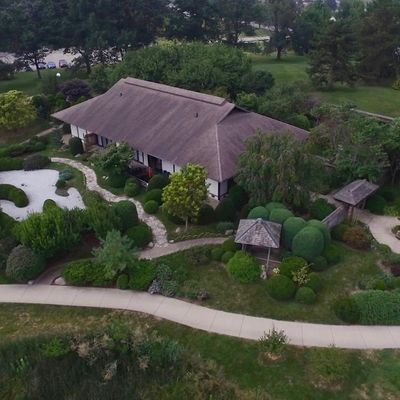Japan House Fall Open House - featuring Fukushima Artists
Schedule
Sat Oct 18 2025 at 11:00 am to 04:00 pm
UTC-05:00Location
Japan House | Urbana, IL

About this Event
Japan House's annual Fall Open House resumes on Saturday, October 18 featuring three visiting artists from Fukushima: Seiran Chiba, Shinya Terasawa, Masaji Hashimoto, and Hirohisa Saito.
From 11am-3pm, the Fukushima artists will have their art pieces on display throughout Japan House for visitors to view an enjoy. Visitors will have the opportunity to purchase a select number of pieces to directly support the artists - cash or Paypal is accepted.
At 3pm, there will be opening remarks from Japan House and the Fukushima Governor Masao Uchibori followed by the four artists giving a free presentation about their art, their history, and about their practices. There will be a Q&A to follow. The presentation is free, but donations are welcomed. Space is limited to the first 30 guests.
Traditional Japanese tea ceremonies will be offered by the Chado Urasenke Tankokai Urbana-Champaign Association at 11am, 11:30am, 12pm, 12:30pm, 1pm, 1:30pm, and 2pm. In addition to a bowl of freshly whisked matcha, we are pleased to share a variety of different wagashi from Fukushima. We are incredibly thankful to the Fukushima Governor's office for providing these special sweets!
Guests may select from the outdoor ryurei (table-style) tea ceremony (seated on chairs) or the indoor tea ceremony on tatami (seated cross-legged on tatami). Please dress appropriately as legs are covered traditionally in Japan. All guests will be asked to remove shoes when entering Japan House, and to wear socks if participating in a tea ceremony. Tickets per person ($16.00) are required to attend a tea ceremony; limited walk-ins where space allows to ensure a tranquil experience for guests. The tea ceremony will take approximately an hour.
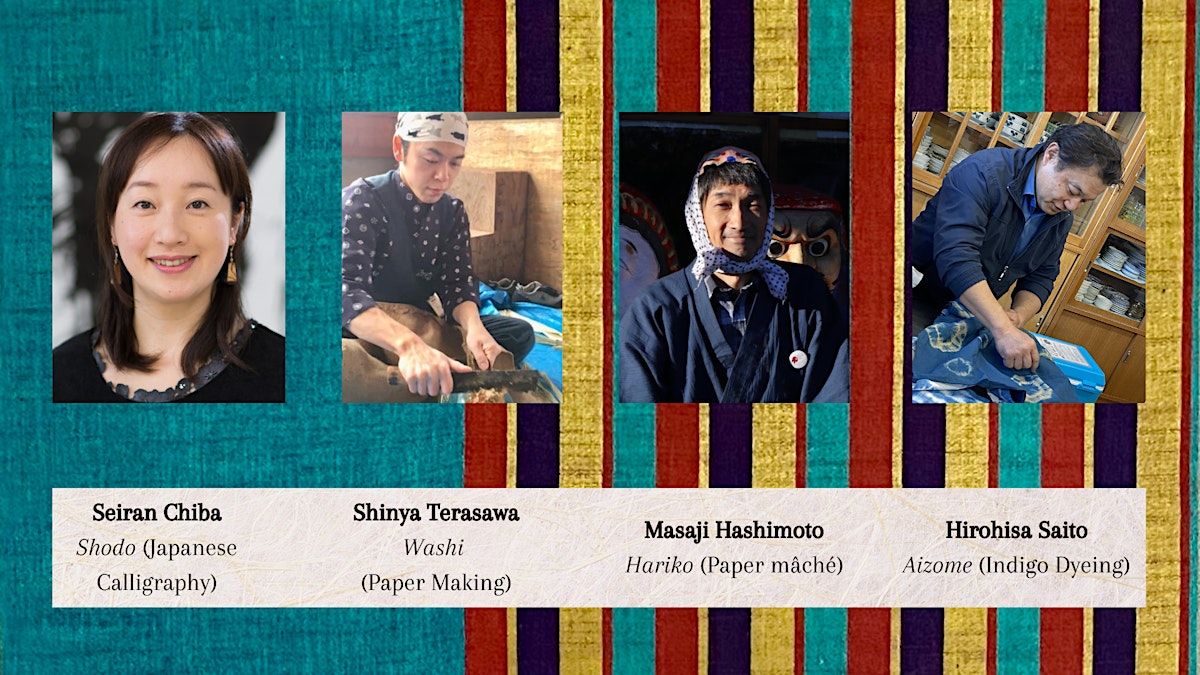
About the Fukushima Artists and Craftspeople
Seiran Chiba is a world-renowned Japanese shodo (calligraphy) artist from Fukushima. Originally born in Tokyo, she is now a Cultural Ambassador for the Fukushima Tourism Exchange. She is active as a traveling calligrapher, embarking on journeys such as the ‘Calligraphy Tour of All 59 Municipalities in Fukushima Prefecture’ and the ‘Japanese Calligraphy Journey.’ Since 2013, she has been conducting large-scale calligraphy demonstrations and workshops at overseas educational institutions. In 2020, she provided calligraphy for the 2020 Tokyo Olympic commemorative monument, and in 2024, she won the Minister of Education, Culture, Sports, Science, and Technology Award at the 2024 National Open Calligraphy Exhibition.
Shinya Terasawa is a washi paper craftsman based in the Kamikawasaki Washi (Traditional Japanese Paper) Folklore Museum. The Kamikawasaki area of Nihonmatsu City is a production area of handmade washi paper with a history of about 1,000 years, and this facility was built in 2001 with the aim of passing on and preserving Kamikawasaki washi paper. He operates the workshop within the museum where visitors can observe the washi paper-making process and experience making washi paper. In 2021, he launched a project called Washito, dedicated to the promotion of Kamikawasaki washi.
Masaji Hashimoto is an 18th generation artisan of Hashimoto Hiroji Mingei located in Takashiba Craft Village in Koriyama City, Fukushima. Takashiba Craft Village has 300 years of history of hariko. Many artisans continue to handcraft hariko dolls there, and visitors can observe the production process up close. He is also a successor of the Hyottoko Odori, one of the dances along with Shichifukujin Odori, designated as Important Intangible Folk Cultural Properties of Koriyama City.
Hirohisa Saito is a printmaker and aizome (Japanese indigo dyeing) artist with nearly 40 years of experience in the field. He graduated from Nihon University College of Art in 1981 and completed additional studies at Nihon University College of Art's Art Research Institute in 1983. In 1985, he established Saito Graphic Arts. Saito spent two years in Los Angeles from 1989 as an Overseas Research Fellow for the Agency for Cultural Affairs to study screen printing. His works have been featured in solo exhibitions at various galleries and received various awards. As an educator, he is a part-time lecturer at Koriyama Women's University and a part-time lecturer at Tokyo University of the Arts. He is a Member of the Saitama Prefecture Art Association, Vice President of the Saitama Prefecture Printmakers’ Association, and Auditor of the Fukushima Watercolor Painting Association.
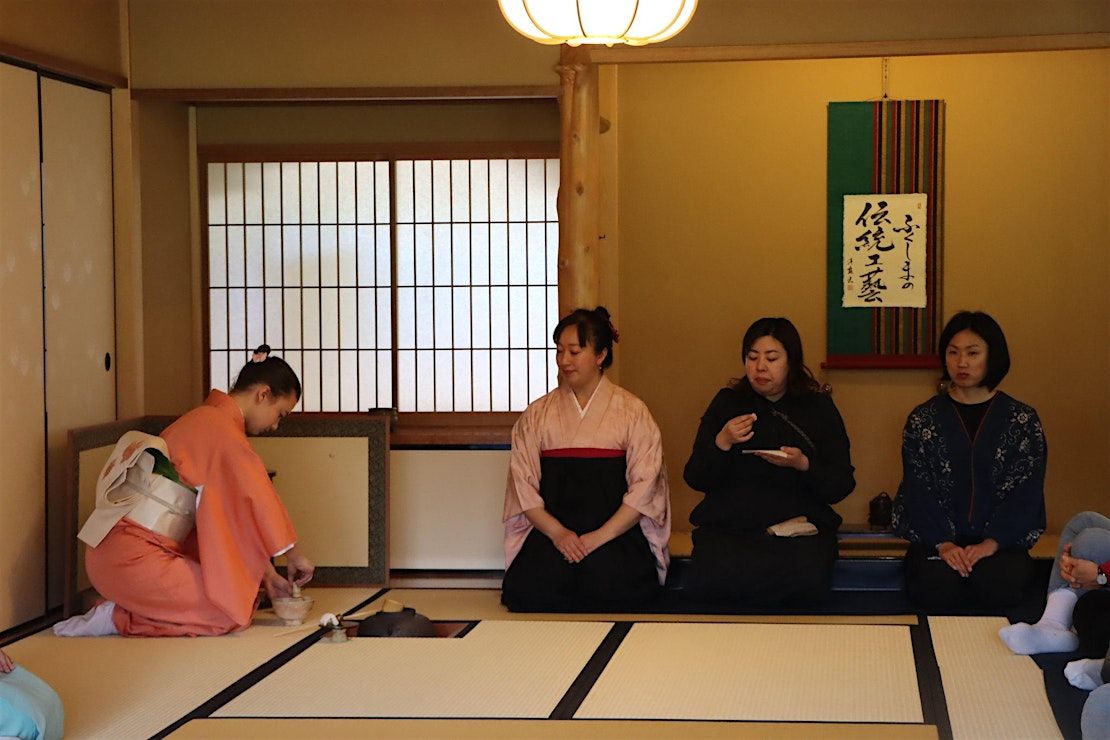
Kogei (工芸) translates to traditional arts and crafts. Arts and crafts include disciplines such as ceramics, textiles, woodworking, lacquerware, papermaking, and other means of artistic expression that involve considerable understanding of traditional methods and techniques. Artisans hone their skills to create objects that are both practical and aesthetically pleasing. Kogei artists and their produced objects are valued for their rich history that reflect intangible cultural heritage spanning hundreds of years, as techniques and processes are passed down from generation to generation. A category of kogei is mingei, (民芸), which translates to “folk crafts,” and is formed from minshu (民衆), meaning common people, and kogei (工芸). Art critic and philosopher Soetsu Yanagi created this term and the mingei movement in the 1920/30s to distinguish the value of everyday items made for ordinary use for the common person.
The Kogei exhibition and programming are supported by the Japan Foundation New York through the U.S.-Japan Community Grassroots Exchange Program. Japan House is proud to highlight the traditional arts and crafts of Fukushima and feature the stories of Fukushima. Japan House acknowledges support from the Illinois Arts Council for this program. In addition, Chiba is a George A. Miller Visiting Artist supported by the Center for Advanced Study at the University of Illinois.
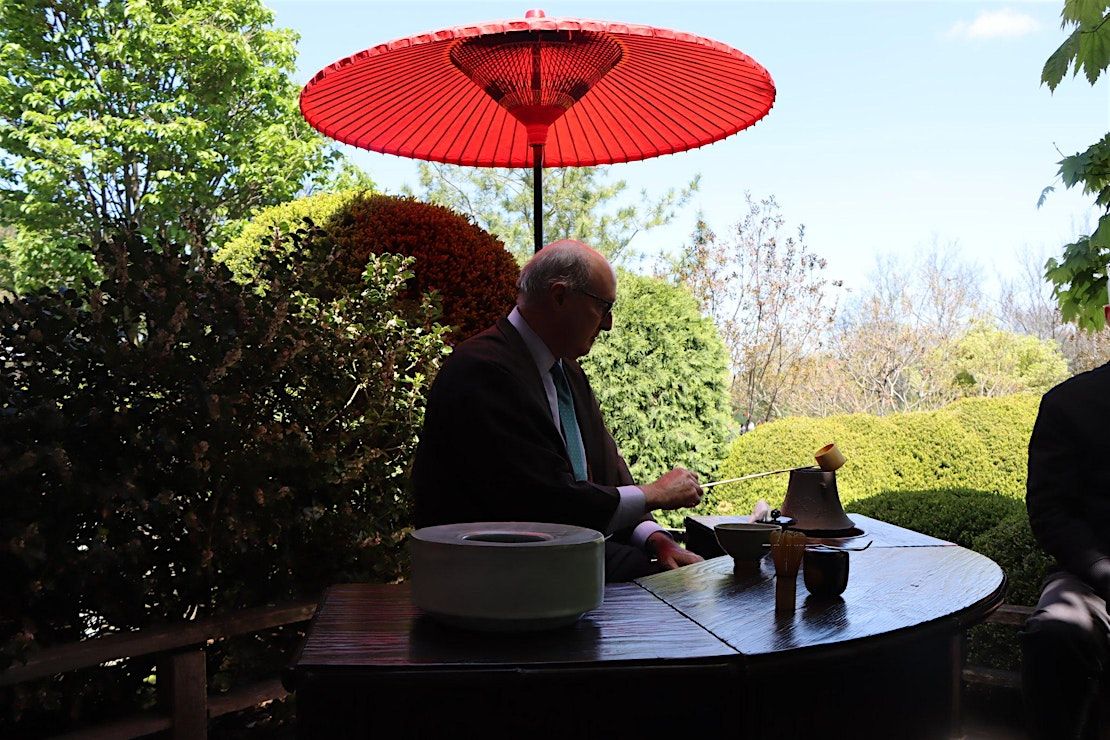
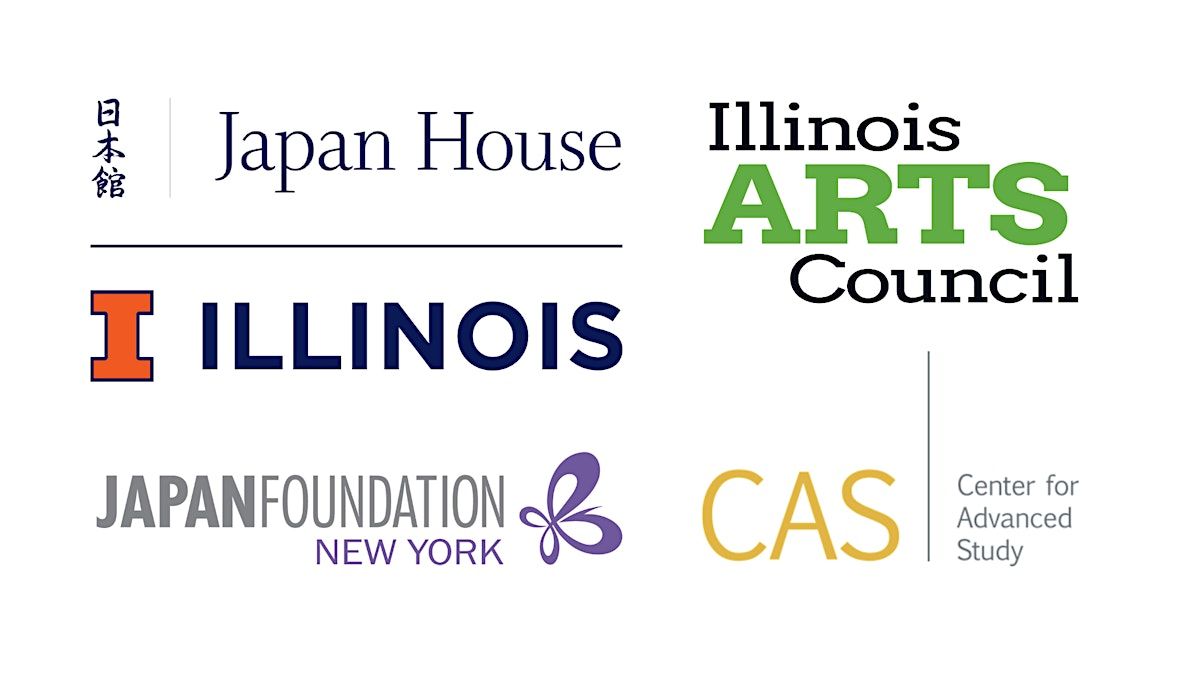
FAQs
What are my transport/parking options getting to the event?
Japan House is located in the Arboretum at the University of Illinois at 2000 S. Lincoln Avenue between Kirby/Florida and Windsor Road. Parking is available in the lot to the north of Japan House (F-31 at St. Mary's Road and Lincoln) and to the south of Japan House (F-32 on Lincoln across from the Vet Med complex). Spaces are marked with a placard and must be paid with Mobile Meter (https://mobilemeter.us/) or Park Mobile (https://parkmobile.io/ ) phone apps, or by calling 217-207-3033. After 5pm and weekends all parking spaces are free.
There are bike racks near both parking lots for scooters, bikes, and electronic transportation devices.
The MTD Silver comes near Japan House on Lincoln Ave but buses also service PAR/FAR and you may walk from there to Japan House.
The front door is located on the north side of the building. Please allow plenty of time to arrive and get to the front door so we may start on time.
Questions about accommodations or accessibility?
Please email [email protected] if you have any questions regarding any questions about accessibility, accommodations for food allergies, or other inquiries.
Is my registration/ticket transferrable?
Yes, ticket transfers are possible with a minimum of 48 hours advance notice and if there is space in the new time requested. Please contact [email protected] if you have any questions.
Do I have to bring my printed ticket to the event?
You do not have to bring your ticket. We will just need your name to check in.
The name on the registration/ticket doesn't match the attendee. Is that okay?
The purchaser of the ticket can go to "My Tickets" and change the name to whomever will be attending.
What is the refund policy?
Your registration is refundable if you contact us at [email protected] at least 48 hours before the date of your reservation. Please note that EventBrite fees are non-refundable. Refunds will not be issued for lateness to the assigned ticket time so we asks that guests arrive a few minutes prior to check-in.
Are there certain requirements or an age limit to enter the event?
The tea ceremonies and presentation are for all ages. Children are welcome as long as they are able to sit quietly throughout the tea ceremony and accompanied by an adult guardian. A paid ticket is required for all regardless of whether they partake in the tea and sweet if they wish to participate in the tea ceremonies. Otherwise, for guests passing through to observe, please be mindful of noise levels and remain seated during the tea ceremony. We kindly ask that strollers/bikes are parked outside to maintain accessibility for all guests. For the presentation, children are welcome as long as they are able to sit quietly throughout the presentation and are accompanied by an adult guardian at all times.
What is Tomonokai? How can I support Japan House?
Tomonokai are "Friends of Japan House". The Tomonokai program was established in 1998 with a goal of supporting Japan House programming and events and promoting an understanding of Japanese Arts and Culture. This tax deductible membership entitles you to special member benefits including discounts on events and merchandise, and vouchers for private tea ceremonies.
Japan House is non-profit and fully relies upon the generosity and kindness of supporters to continue to provide our campus and community vibrant programming that is immersive, engaging, and most importantly, that celebrates diversity! Consider becoming Tomonokai, or Friend of Japan House, or support by clicking here.
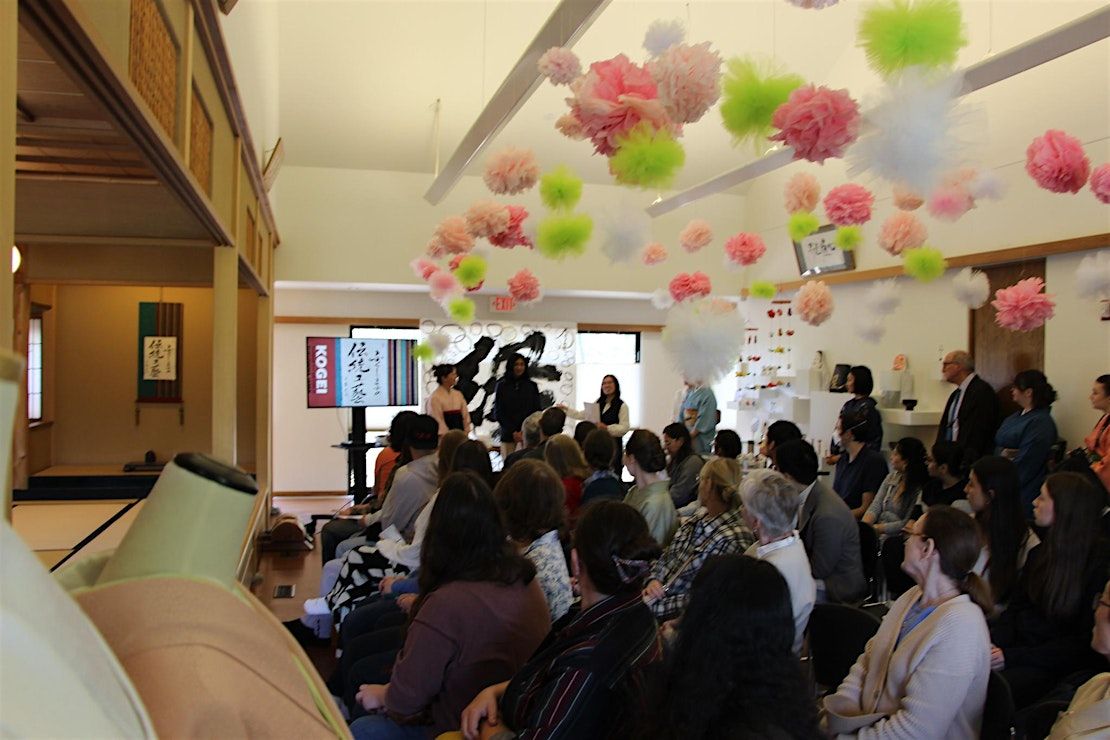
Where is it happening?
Japan House, 2000 South Lincoln Avenue, Urbana, United StatesEvent Location & Nearby Stays:
USD 0.00 to USD 18.91
